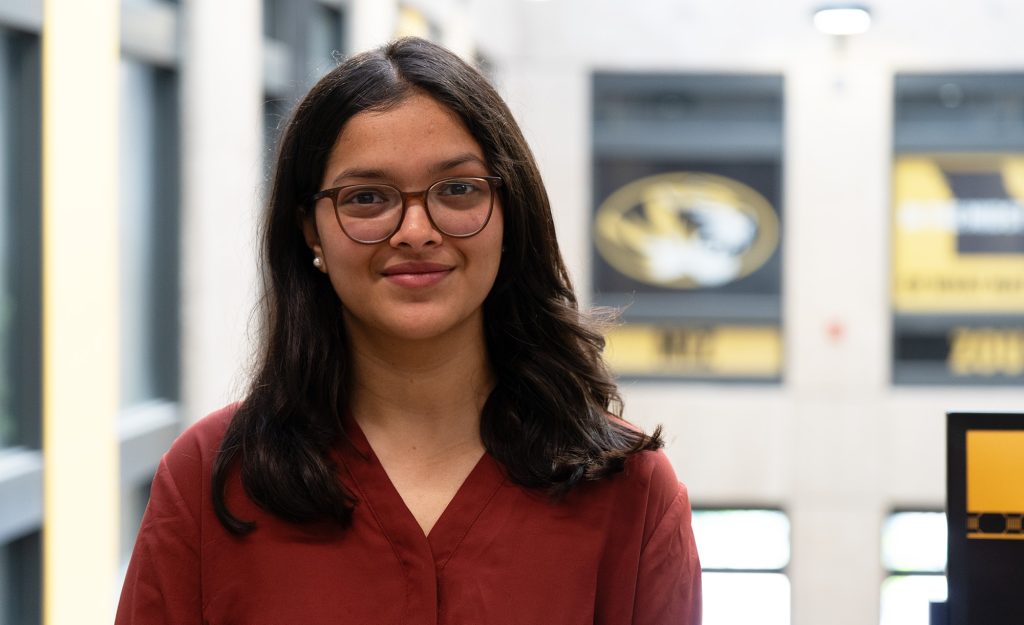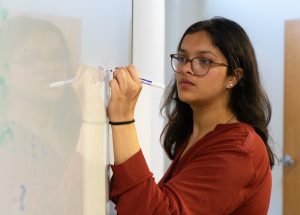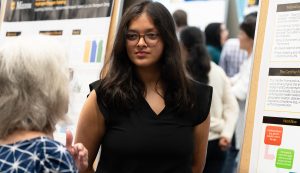
Story and photos by Logan Jackson
- Pari Patel – senior computer science major
- Mentor: Prasad Calyam, Curators’ Distinguished Professor in the Department of Electrical Engineering and Computer Science; director of the Cyber Education, Research and Infrastructure Center (Mizzou CERI)

Pari Patel knew she was going to pursue research while at the University of Missouri, but she wanted to make sure she chose a laboratory and project that she was passionate about. Patel found the perfect spot last year in the Mizzou Cyber Education, Research and Infrastructure Center (Mizzou CERI), where she has been able to research confidential computing, a technology that protects data while it is being processed.
“When I was first introduced to software like ChatGPT, it definitely brought up a lot of questions tied to how people are just giving free access to their data, which is a big problem,” said Patel, who is a senior computer science major. “My sister used to work for Mizzou Health Care, too, and that led to thoughts about the amount of sensitive data that they must protect. Those questions were the beginning of my interest in how we can better protect all that data.”
Patel has dove into her research a bit more this summer through the Cherng Summer Scholars program. A nine-week research or creative scholarship program for Mizzou students who are pursuing the Honors Certificate, the Cherng Summer Scholars program allows students to participate in individually designed projects under the mentorship of a Mizzou faculty member. The program is supported by a gift from Peggy and Andrew Cherng and the Panda Charitable Foundation.
“The best part of the program has been learning about the research that the other students are conducting,” Patel said. “It’s just so interesting. Everyone is doing such cool work, and without this program I probably wouldn’t have had the opportunity to interact with them.”
Patel spent part of the summer doing a literature review with a focus on finding other studies discussing confidential computing. She has also worked on a variety of tasks with a team of researchers within the lab.

“It’s such a cooperative environment,” Patel said. “Collaboration is encouraged, and I definitely talk with my teammates quite a bit. We figure out what direction we need to go and discuss what steps we then need to take.”
Patel said the ultimate goal of her research is to enable the highest possible level of security for data processing, ensuring that sensitive information remains private at every stage of its lifecycle.
“We want to empower hospitals, banks, government agencies and other organizations to protect their most sensitive data not just when it’s stored or transmitted, but also when it’s actively being processed,” Patel said. “That’s the phase most systems struggle to secure, and it’s where confidential computing can make a transformative difference.”
Patel added that this need extends beyond large institutions.
“Even from an individual perspective, this is incredibly important,” Patel said. “For example, when you use a smartphone, the operating system, controlled by the device manufacturer or service provider, can technically access the data your apps are processing. With confidential computing, that processing happens inside secure enclaves, meaning that even the operating system or the device owner cannot view the protected data.
“This is a truly exciting project. As an undergraduate, having the opportunity to work on something that could meaningfully improve global data privacy is incredible. I’m grateful for the chance to contribute to research with the potential to make such a broad and lasting impact.”